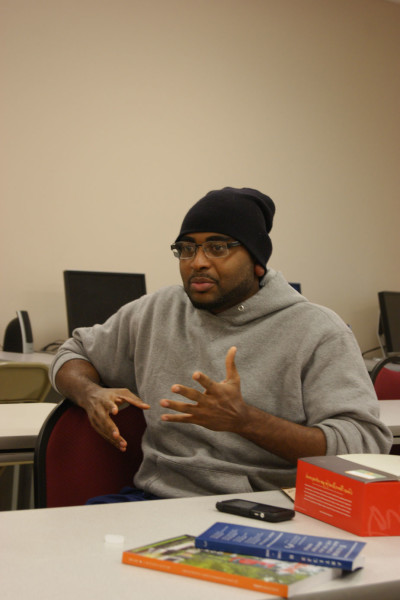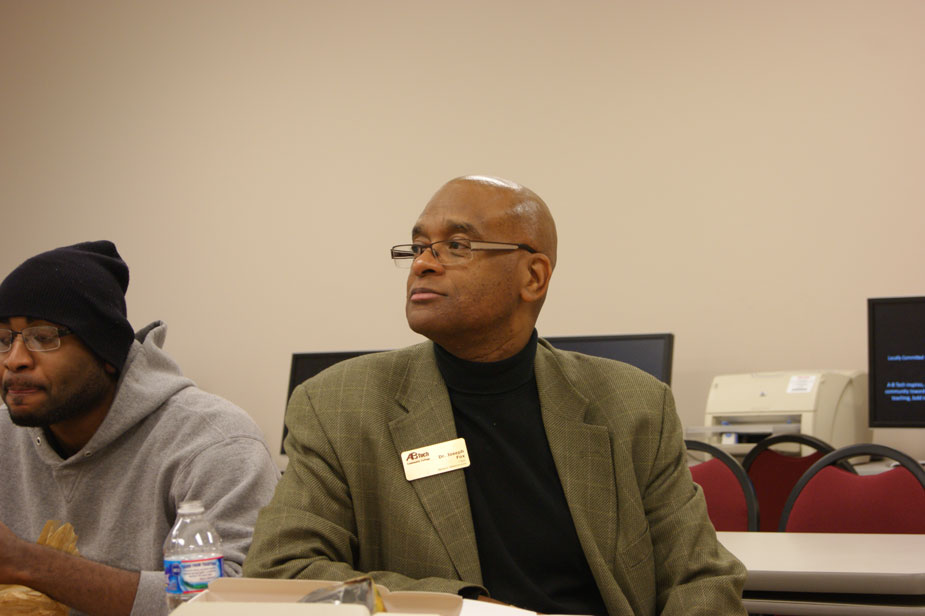The Minority Student Leadership Academy (the Academy)
The Minority Student Leadership Academy (the Academy) at Asheville-Buncombe Technical Community College (ABTech) was established in 2008 to increase retention and graduation rates among minority male students as well as provide leadership and training opportunities. Initial funding was provided through the NC Community College System, secured through a federal crime prevention grant, to address retention and graduation for minority males, specifically.1
The Academy seeks to develop the whole student.
However, over time, the initiative has expanded its reach to allow all students at ABTech to participate if they wish to join. Similar to other programs of its kind, the Academy seeks to develop the whole student by offering a wide range of support services from academic tutoring and mentoring, to workshops on time and financial management and health and physical appearance.2
However, unlike other similar programs, ABTech received a grant specifically to determine the Academy’s impact through both quantitative and qualitative data. This is significant because data to support program goals and outcomes will increase the chances of securing future funds to maintain and enhance the program. It will also allow staff to accurately assess what is working and what needs refinement to make sure the initiative is supporting students in the best and most effective ways possible.
The commissioned evaluation report was divided into five sections:
- Community snapshot– the student body profile of the Academy participants
- Retention– a comparison of retention rates between Academy participants and the general student body
- Perceptions– interviews of students, faculty, and staff about their experience with the Academy
- Benchmarking-examination of and comparison with other similar programs initiated through the community college system’s Minority Male Mentoring program
- Literature review– a compilation of recent reports and other documents on the topic of minority student retention.3
Community Snapshot
While the Academy was originally designed for minority males specifically with a more targeted intervention, ABTech made the decision to expand its reach first to include minority females and then to all interested students, regardless of minority status.
This means that the demographics of participants may not reflect the demographics of similar programs on other campuses. For example, the growth rate of minority male participants has grown but not nearly as fast as that of minority female participants over the years since the program’s inception.
In addition, in a random sample taken in the fall 2012 semester, 63 percent of Academy participants identified as African American, 11 percent identified as white and 5 percent as Hispanic. The age of participants also varies widely. While the average age of participants is 31, the spread ranges from 18 to 60 years old.4

Retention
Among both male and female participants in the Academy, there is a clear retention trend from fall to fall semester but a drop-off in the spring semester. This can be attributed to the fact that students recognize the support of the Academy when enrolling in new classes, something that normally happens in the fall.
Even though students are less likely to re-enroll in the Academy in the spring semester, they do tend to re-enroll at ABTech. Notably, the retention rate for Academy members on average consistently meets or exceeds the retention rate for the general student body at ABTech, suggesting that the support provided by the initiative is instrumental.5
Perceptions
The participant perception of the Academy is, for the most part, very positive. Many students underscored the critical support and community building the initiative provides.
The concern most echoed by students was the lack of awareness of the program across campus. Many describe it as ABTech’s “best kept secret.” Students also react positively to the Academy’s mentoring, although most claimed that the relationships between students and mentors tended to form organically between interested parties with no central mechanism to connect students to mentors.
With the benefits of mentors well-documented, this could be a possible area for improvement within the Academy.

Among the most favorable aspects of the program, according to participants, are the relationships built with administrators and faculty. These relationships provide support and increased personal accountability that, in turn, lead to increased success both academically and personally.
The feedback from faculty and staff paint a similar picture of the Academy. Faculty and staff are committed to the program and its students and view the relationships developed as one of the most important benefits.
They also feel that while the program is seeing relative success on the ground, it is not supported enough by the administration in order to reach its full potential.6
Benchmarking
The Minority Male Mentoring Program (M3P), sponsored and supported by the NC Community College System, is currently being implemented on 46 of the system’s 58 campuses.
However, in the fall of 2012, ABTech declined to reapply for funding from the central office. This may be due to the fact that the Academy’s mission has shifted away from traditional M3P principles of targeting and supporting only minority males.
For this reason, it is difficult to set benchmarks alongside other M3P programs. However, in general, programs established to raise attainment levels through the provision of critical mentoring and support services tend to see favorable results.7 This is indeed the case at the Academy at ABTech.

Literature Review
The program evaluation concludes with a bibliography of resources on the topic of minority student retention and graduation that can be used to provide context regarding the challenge of minority student educational attainment and offer an important description of the Academy and programs like it.8
One of the Academy’s greatest challenges, as perceived by participants and staff, is a lack of clarity and exposure.
There is confusion around the Academy’s role, which creates barriers to access and participation. This could be caused by a lack of internal marketing or by expanding the target audience beyond what is usually the case with other minority mentoring programs. Because the Academy is open to all ABTech students and not only minority males, the services and mission may be diluted or perceived to be diluted. However, this must be weighed against the additional number of students who benefit from the Academy each year.
Introduction Part One Part Two Part Three
Promising Programs Statewide: Fayetteville State University
Promising Programs Statewide: Elizabeth City State University
Promising Programs Statewide: College of The Albemarle
Michelle Goryn is a writer and public policy consultant in Raleigh, NC.
Paige C. Worsham is Senior Policy Counsel with the North Carolina Center for Public Policy Research and conducted the interviews and convenings for this project.
The N.C. Center for Public Policy Research is grateful to numerous, generous supporters. Major funding for this project is provided by the Lumina Foundation for Education, with additional funding from the James G. Hanes Memorial Fund, and the Hillsdale Fund.
- Minority Student Leadership Academy Program Evaluation Report, Asheville-Buncombe Technical Community College, hard copy provided by ABTech. ↩
- Minority Student Leadership Academy website, ABTech, https://www.abtech.edu/msla. ↩
- Minority Student Leadership Academy Program Evaluation Report, note 1 above. ↩
- Ibid. ↩
- Ibid. ↩
- Ibid. ↩
- Ibid. ↩
- Ibid. ↩

